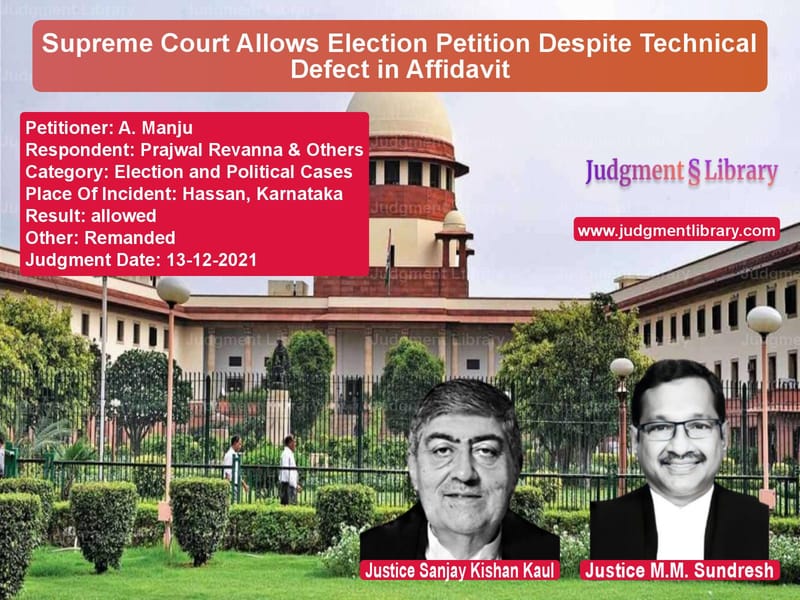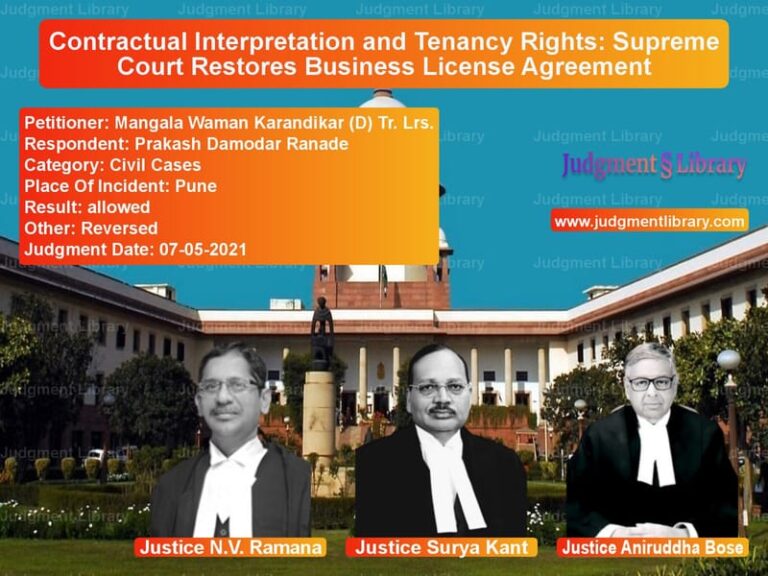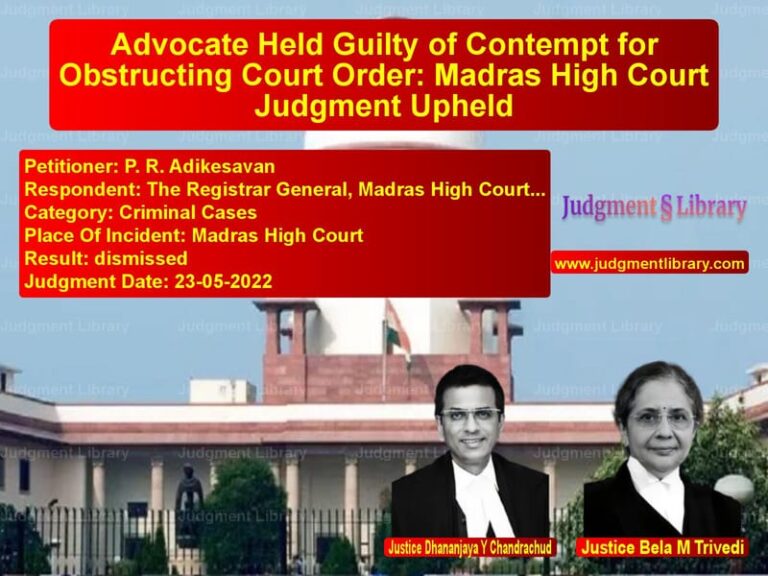Supreme Court Allows Election Petition Despite Technical Defect in Affidavit
The Supreme Court of India recently ruled in favor of A. Manju, allowing his election petition to proceed despite a technical defect in the accompanying affidavit. The case, A. Manju vs. Prajwal Revanna & Others, involved a challenge to the election of the respondent based on allegations of false affidavit submission and non-disclosure of assets. The Karnataka High Court had dismissed the petition at the threshold, citing non-compliance with Section 83(1) of the Representation of the People Act, 1951. The Supreme Court overturned this ruling, emphasizing that minor procedural defects should not prevent an election petition from being heard on its merits.
Background of the Case
The appellant, A. Manju, contested the 2019 parliamentary election from the 16 Hassan (General) Constituency in Karnataka as a candidate of the Bharatiya Janata Party (BJP). The respondent, Prajwal Revanna, was the candidate of the Janata Dal (Secular) and won the election with 6,76,606 votes, while the appellant secured 5,35,282 votes. Dissatisfied with the election outcome, Manju filed an election petition under Section 81 of the Representation of the People Act, 1951, challenging Revanna’s election.
Manju’s primary contention was that Revanna had filed a false affidavit regarding his assets, violating the disclosure requirements under Section 33A of the Representation of the People Act. He sought to have Revanna’s election declared void and himself declared the winner as the runner-up.
Respondent’s Objections Before the High Court
Revanna filed an application under Order VII Rule 11 of the Civil Procedure Code, arguing that the election petition was not maintainable due to:
- Non-compliance with Section 81(3): The copies of the petition were not attested as true copies by the petitioner.
- Absence of a Form 25 affidavit: Since the petition included allegations of “corrupt practice,” the petitioner was required to submit an affidavit in the prescribed format, which was missing.
- Failure to substantiate allegations: The respondent argued that the allegations of false disclosure were not accompanied by sufficient particulars as mandated by Section 83(1) of the Act.
The Karnataka High Court accepted these objections and dismissed the election petition on January 17, 2020.
Supreme Court’s Observations
The Supreme Court examined the High Court’s reasoning and made the following key observations:
- Substantial Compliance with Section 81(3): The petitioner had attested the main election petition and its copies. The minor omission of verifying the index and synopsis was not fatal.
- Absence of a Form 25 Affidavit Was Curable: The Court held that while an affidavit in the prescribed format is mandatory when alleging corrupt practices, its absence does not automatically render the petition invalid.
- Technical Defects Should Not Defeat Substantive Justice: Relying on precedents such as Ponnala Lakshmaiah vs. Kommuri Pratap Reddy and G.M. Siddeshwar vs. Prasanna Kumar, the Court reiterated that election petitions should not be dismissed for minor defects in form.
Final Judgment
The Supreme Court allowed the appeal, setting aside the High Court’s order. The key directives were:
- The election petition was restored for trial before the Karnataka High Court.
- The petitioner was granted 15 days to submit an affidavit in Form 25 to cure the defect.
- The High Court was directed to expedite the proceedings, given the two-year delay.
Key Takeaways
- Election petitions should be decided on merits: Courts should not dismiss valid challenges based on minor procedural errors.
- Affidavit requirement is mandatory but curable: The Supreme Court clarified that a missing Form 25 affidavit does not automatically render an election petition non-maintainable.
- Judicial discretion in election matters: The ruling reaffirms that courts should adopt a pragmatic approach to technical lapses in election disputes.
This judgment is a crucial precedent in election law, reinforcing the principle that election petitions should not be dismissed for procedural irregularities that can be remedied.
Petitioner Name: A. Manju.Respondent Name: Prajwal Revanna & Others.Judgment By: Justice Sanjay Kishan Kaul, Justice M.M. Sundresh.Place Of Incident: Hassan, Karnataka.Judgment Date: 13-12-2021.
Don’t miss out on the full details! Download the complete judgment in PDF format below and gain valuable insights instantly!
Download Judgment: a.-manju-vs-prajwal-revanna-&-ot-supreme-court-of-india-judgment-dated-13-12-2021.pdf
Directly Download Judgment: Directly download this Judgment
See all petitions in Public Interest Litigation
See all petitions in Legislative Powers
See all petitions in Judgment by Sanjay Kishan Kaul
See all petitions in Judgment by M.M. Sundresh
See all petitions in allowed
See all petitions in Remanded
See all petitions in supreme court of India judgments December 2021
See all petitions in 2021 judgments
See all posts in Election and Political Cases Category
See all allowed petitions in Election and Political Cases Category
See all Dismissed petitions in Election and Political Cases Category
See all partially allowed petitions in Election and Political Cases Category







